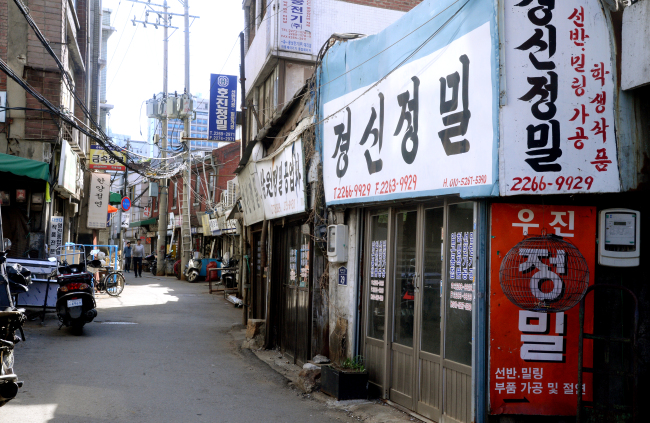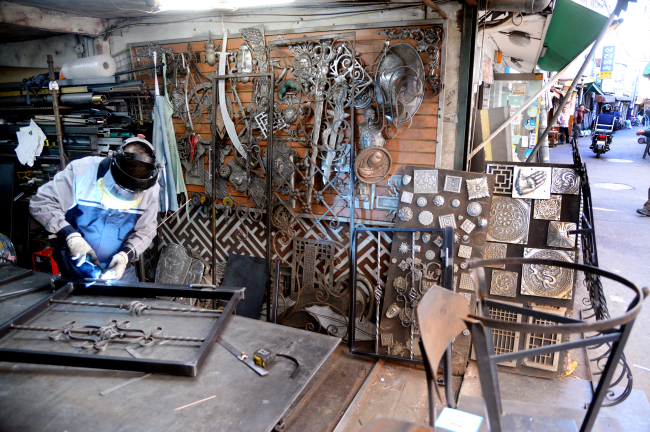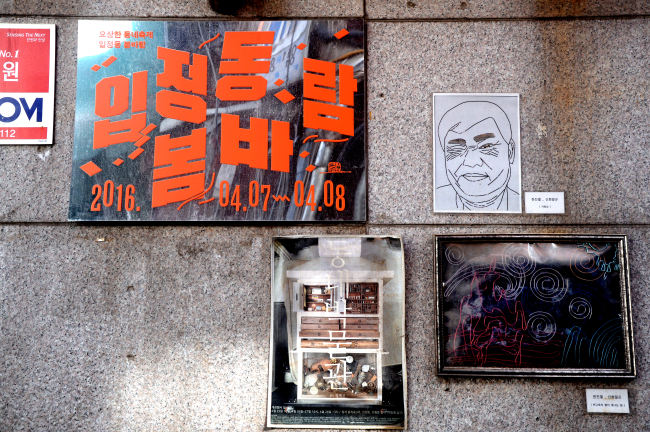[Seoul Saunter] Remnants of good ol’ days
Streets of old-fashioned hardware stores in Euljiro offer peek at the capital during times of industrialization
By Yoon Min-sikPublished : April 17, 2017 - 16:02
Seoul is a vibrant megalopolis with modern high-rises crowding the city’s major arteries. Nestled among the gleaming buildings are maze-like alleys that appear to have escaped the passage of time. The Korea Herald explores the many nooks and crannies of Seoul, proclaimed the capital of Joseon in 1392, that reveal a multifaceted city. -- Ed.
Halfway up the stairs of Euljiro 3-ga Station in central Seoul, a sharp smell of metal pierces your nose.
Stepping away from the passing vehicles into the narrow alleyway, you will find a row of time worn buildings, faded billboards written in Korean that sound foreign to an average person.
“What in the world is ‘Pau’?” you wonder, before an old-timer tending his shop says it refers to the “buffing” process for smoothing a workpiece’s surface.
Welcome to Euljiro’s workshop alley, where small metalwork shops that line the narrow alley have made and sold tools the same way since the post-Korean War era.
The alley was referred to as a “do-it-all alley” until the mid-1990s, with its shops ranging from ones specializing in tools, metalwork, tiles and even sewing. Any little things you need in everyday life you could find, strolling across the alley.
Over time, the small-scale shops eventually lost the vast majority of customers as mass-produced products started flooding the market. It appeared as though it would only be a matter of time before the old alleys faded into obscurity and insignificance.
But the headstrong craftsmen, stubbornly refusing to change their ways, have become a unique attraction for the neighborhood as people begin to seek the place to indulge in 1970s and ‘80s nostalgia.
Halfway up the stairs of Euljiro 3-ga Station in central Seoul, a sharp smell of metal pierces your nose.
Stepping away from the passing vehicles into the narrow alleyway, you will find a row of time worn buildings, faded billboards written in Korean that sound foreign to an average person.
“What in the world is ‘Pau’?” you wonder, before an old-timer tending his shop says it refers to the “buffing” process for smoothing a workpiece’s surface.
Welcome to Euljiro’s workshop alley, where small metalwork shops that line the narrow alley have made and sold tools the same way since the post-Korean War era.
The alley was referred to as a “do-it-all alley” until the mid-1990s, with its shops ranging from ones specializing in tools, metalwork, tiles and even sewing. Any little things you need in everyday life you could find, strolling across the alley.
Over time, the small-scale shops eventually lost the vast majority of customers as mass-produced products started flooding the market. It appeared as though it would only be a matter of time before the old alleys faded into obscurity and insignificance.
But the headstrong craftsmen, stubbornly refusing to change their ways, have become a unique attraction for the neighborhood as people begin to seek the place to indulge in 1970s and ‘80s nostalgia.



While not as productive as their larger competitors, the shop owners take pride in their skill acquired through decades of experience. The workshops offer a chance to actually see the tools being used to make metal products.
The area surrounding the shops also looks as though it is suspended in time. In Seoul, it is not easy to find tea shops or “dabang” that were very popular in the past as a place to socialize -- a forerunner to today’s omnipresent cafes.
Eulji Dabang looks as though it has just jumped out of a 1980s flick, complete with leather sofas and a 2,500 won ($2.20) cup of coffee.
“There aren’t that many dabang like this anymore. Sitting here, sipping on a cup of coffee makes me very comfortable,” said 60-year-old Kim who says he is a regular at the shop.
The adjacent Eulji Myeonok specializing in naengmyeon (noodles in cold broth) or Korean-style barbecue joint Tongiljip are just some of the famed eateries that nostalgic visitors can try. In 2015 the Seoul Metropolitan Government designated the “Nogari (dried pollack) Alley” -- which has some dozen bars -- as one of Seoul Future Heritage.
In a bid to capitalize on the unique characteristics of the alley, Seoul’s Jung-gu office has been running “Eulgi-Uram (Eulgi Tour).” Tour participants can visit the workshop alley and surrounding areas including the Nogari Alley and other eateries.
Choi Chang-sik, the head of Jung-go office, said in a recent media interview that he hopes that the program would be the first step toward revitalizing the industry in the streets of Euljiro, and ultimately Jung-gu.
“Euljiro is a place where you can find remnants of those who were the pillars of Korea‘s modernization. I wish to show (visitors) the true beauty of Euljiro via the tour,” he said.
The free tour commences Monday through Saturday at 3:00 p.m. One can apply at http://www.junggu.seoul.kr/tour/content.do?cmsid=4899 or make inquiries at (02)3396-5085.
By Yoon Min-sik (minsikyoon@heraldcorp.com)





![[From the Scene] Monks, Buddhists hail return of remains of Buddhas](http://res.heraldm.com/phpwas/restmb_idxmake.php?idx=644&simg=/content/image/2024/04/19/20240419050617_0.jpg&u=20240419175937)









![[From the Scene] Monks, Buddhists hail return of remains of Buddhas](http://res.heraldm.com/phpwas/restmb_idxmake.php?idx=652&simg=/content/image/2024/04/19/20240419050617_0.jpg&u=20240419175937)

![[KH Explains] Hyundai's full hybrid edge to pay off amid slow transition to pure EVs](http://res.heraldm.com/phpwas/restmb_idxmake.php?idx=652&simg=/content/image/2024/04/18/20240418050645_0.jpg&u=20240419100350)

![[Today’s K-pop] Illit drops debut single remix](http://res.heraldm.com/phpwas/restmb_idxmake.php?idx=642&simg=/content/image/2024/04/19/20240419050612_0.jpg&u=)